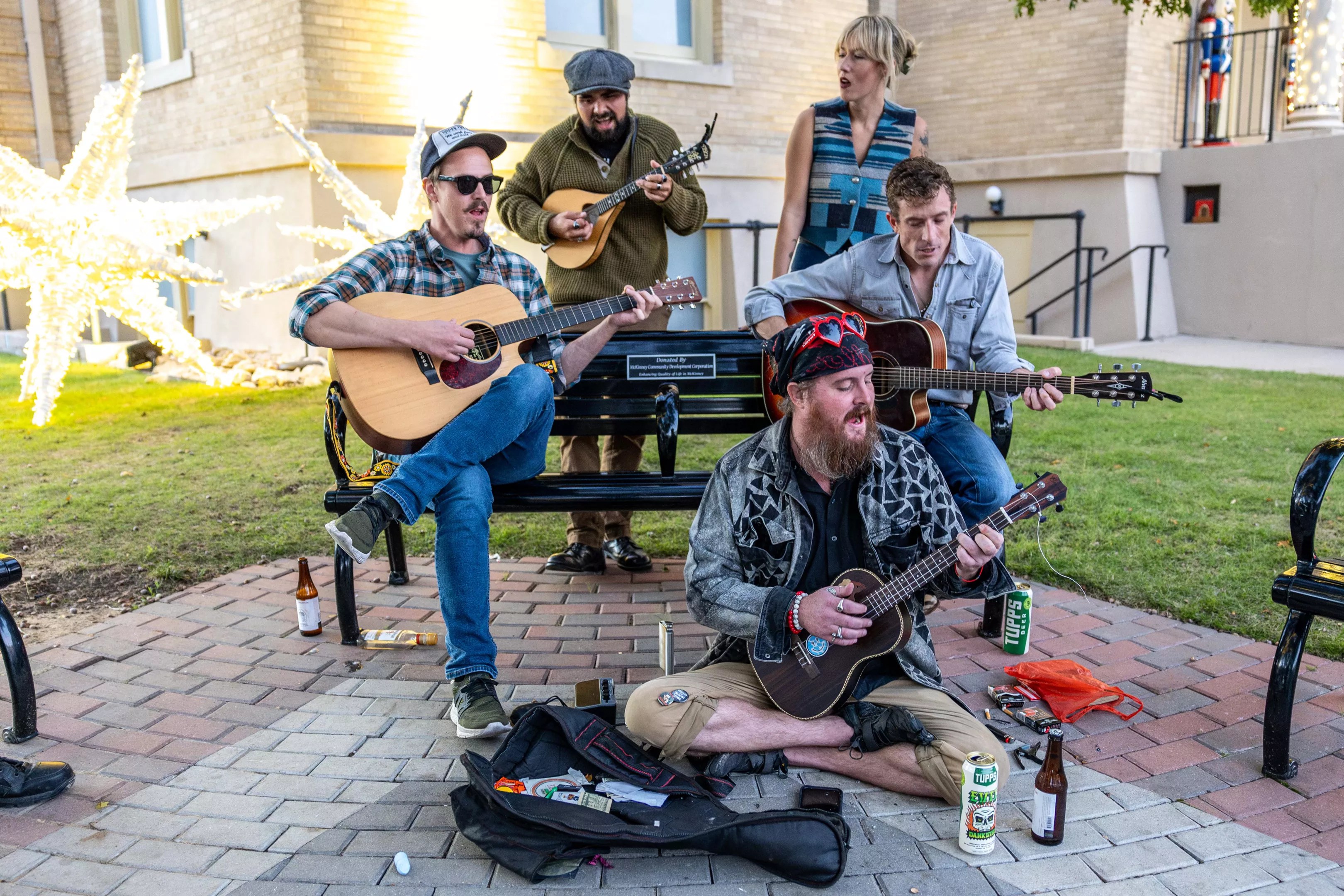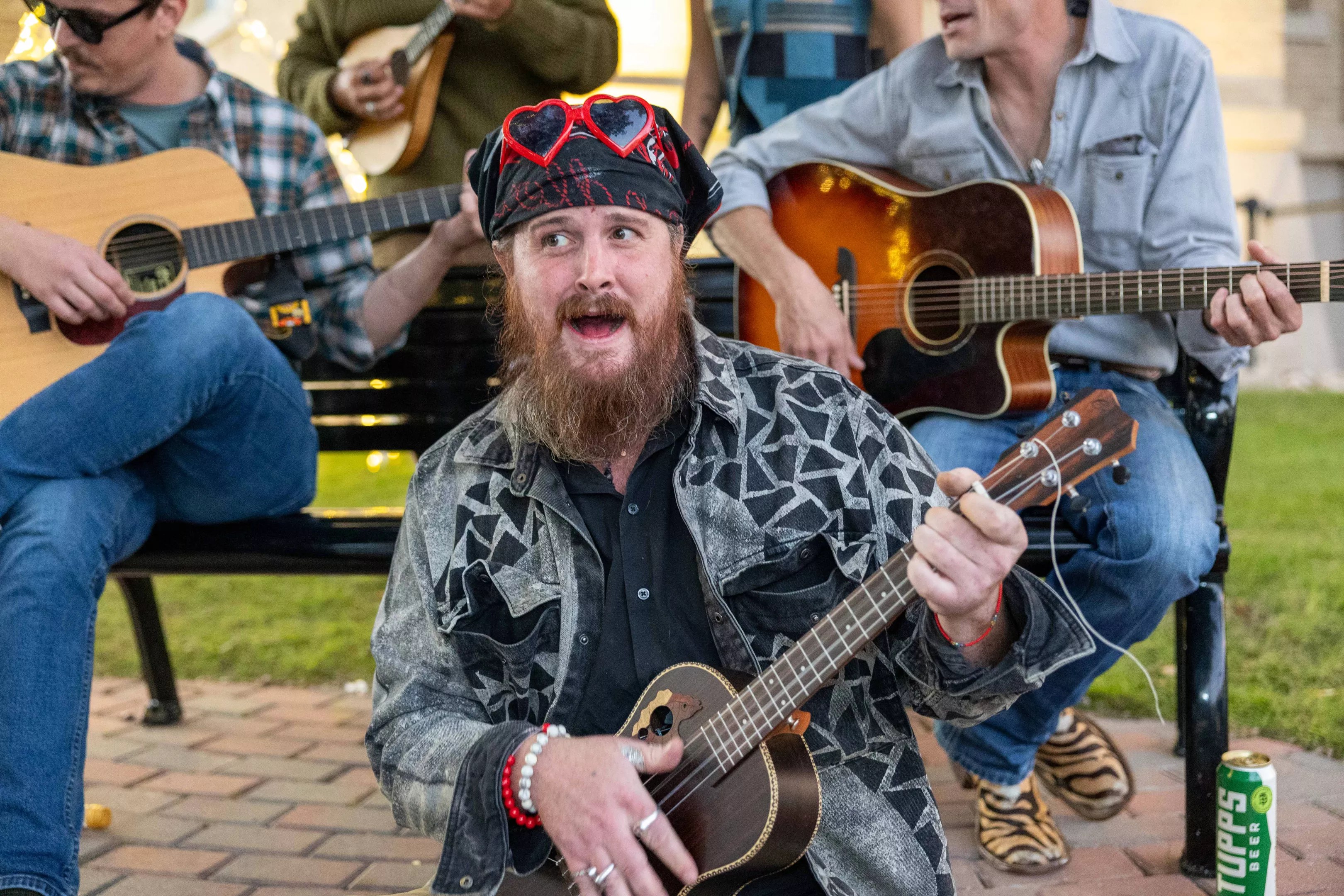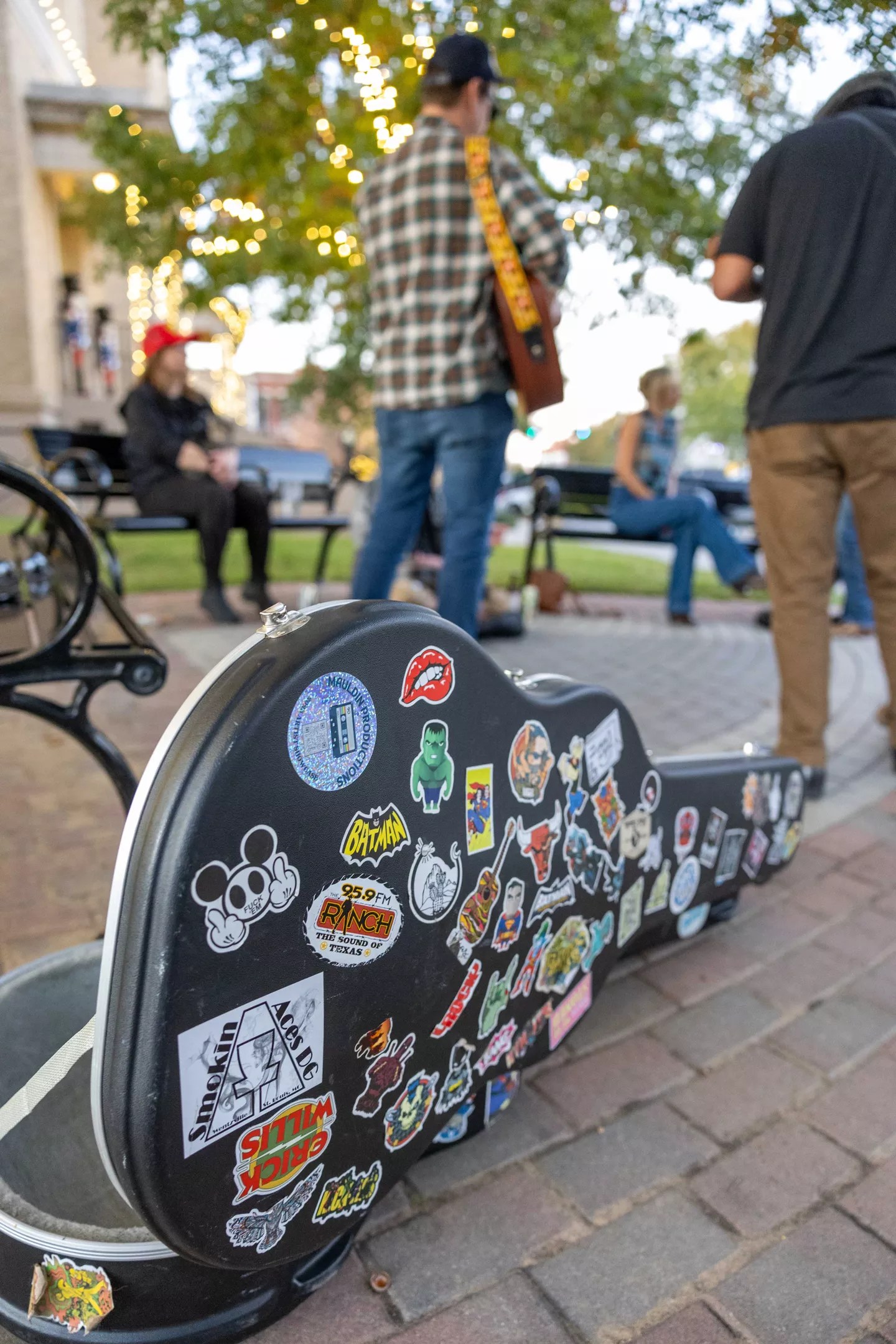
Andrew Sherman

Audio By Carbonatix
Dash Hause sits on the sidewalk at the corner of North Tennessee and East Louisiana streets in the Historic Downtown McKinney Square.
“How would you like to hear the greatest love song you’re ever gonna hear?” he asks, his legs crisscrossed, exposing dirty bare feet. He strums a ukulele plugged into a small amplification device hidden in the instrument’s case.
“It’s not the best love song ever written,” he says. “It’s not the best one ever composed or ever sung. But it’s the best one you’ll just randomly hear.”
It’s hard to pass up the offer. Hause gestures to his right, where Stephen Mize stands tall in a striped suit. He looks manicured, juxtaposing Hause’s gruff appearance with a neatly trimmed beard and smooth wooden guitar. His sunglasses never come off, nor does the slightly tipped fedora on his head. He carries himself with that sort of swagger every time he busks on the McKinney Square, perhaps because he knows this next song is his.
“It’s called ‘Like Us,’ Mize says. “It goes like this.” A softly plucked melody follows, as Hause closes his eyes and listens to Mize’s lyrics: “From the moment I first met you, I wouldn’t soon forget you. As years go by, I still wonder why / You let me make you mine.”
Mize has a lovely voice, but it’s the emotion with which he sings that sets his song apart. Less than a decade ago, he gave up a job as a river and mountain guide at Big Bend National Park to devote all of his time to songwriting.
“I hate work and I’m never gonna do it again,” he says. “I would like to be the best songwriter to ever live.”
There’s a drive about Mize that’s infectious, but one not always shared among the group. Hause rarely writes his own songs.
“I used to be homeless on the East Coast,” he says. “I kind of decided that if I was going to be homeless, I might as well travel.”
Using cash from singing to pay for train rides, Hause drifted west before settling in McKinney. “Wagon Wheel” was his biggest crowd-pleaser, although he doesn’t take money for it anymore. These days, Hause has a corporate job as a software developer. But his living and monetary situations never changed his personality.

Dash Hause once used busking cash to pay for train rides and travel. Now he has settled in McKinney.
Andrew Sherman
“That’s one thing I like about him,” says Mize. “When he got the corporate job and started making good money, he didn’t start dressing in a suit or whatever. He just remained the same.”
Mize, ironically wearing a suit, met Hause when they arrived at the same time to busk. Urban busking is typically territorial, but the two formed a friendship and learned to play one another’s songs.
On weekends, Hause and Mize unite with fellow buskers in the area to form something of a street supergroup. They play mostly originals, save for a “Wagon Wheel” or two when the moment calls for it. Not surprisingly, the moment soon did, and a young man named Luke couldn’t help but take the third verse himself while on a lunch break from his job building greenhouses up the road.
Almost everything about this group goes against the busking standard. In a culture that can be defined by territorial behavior and competition among artists, this crew is all about community.
“I don’t understand why creatives would need to fight,” Hause says.
They don’t even busk for money. During the latest impromptu concert, Mize was reluctant to accept even a few dollars from a young child sent over by his parents.
“That’s not what we’re here for,” he says.
“The beer money is nice,” Hause adds. “But it’s the community of people just coming up and singing.”
Hause is out there the most. He usually gets to his spot around 6 p.m., after his day shift, and sings well past dark until he tires or he strikes up a deep conversation.
This is what the heartbeat of downtown McKinney sounds like, and music is what keeps it pumping. There lies the dilemma. Amplification of any kind is prohibited according to Chapter 70, Article V, Section 70-120(b)(2) of the McKinney City Code.
The group is in a seemingly eternal struggle with some local law enforcement and business owners, who see the noise as a nuisance.
It’s a tricky law to enforce, especially with the community pull that the group has.
“I think the hardest job for law enforcement is that balancing act,” says a McKinney police officer named Tony.
He’s about 5 feet away from Mize’s indiscreetly hidden guitar amplifier, with Hause’s ukulele amp in plain view. They’re quiet enough to be respectful, but loud in a way that allows this flow of collaboration.
“Common sense and discretion should have a huge part of law enforcement,” he continues. “It doesn’t make it any louder than an acoustic guitar is. If we’re gonna massage a sound ordinance, that’s where it would take place. What’s reasonable and allows you to have your right to freedom of assembly versus everybody else’s right?”
This officer is particularly accommodating to the group, but their experiences aren’t always this way. Seven months ago, Mize was briefly detained by a city police officer for playing a drum track on his phone as he played over it on guitar. He recorded the interaction and posted it to YouTube, where it sits at 12,000 views and 216 comments. He didn’t go to jail, but the conflict has since made him apprehensive about police. Luckily, it seems like today’s patrol is more interested in hearing one of his songs than giving him a hard time.
“This is another one of our stragglers,” says Hause as a young woman with blond hair joins the seated circle. Her name is Kitana. She looks no older than 19 and wears thick black headphones at least 10 years old over her ears.
She says she’s been hanging out with Hause since she met him last summer.
“I saved his ass,” she says, before recalling the story of a drunk, depressed Hause just needing someone to talk to on the street corner. “But he saved me as well.”

The busking band has had run-ins with local law enforcement.
Andrew Sherman
Stories like Kitana’s litter the city. It’s hard to speak with Hause for more than a few minutes without being interrupted by passersby, updating him about their lives or requesting a song.
“I met Dash when he came into Spoons one day,” says a Spoons waitress named Celina. “He’d come in and I’d make him an ‘anything.’ Every time I’d make him something different to drink. I’d consider him a good friend. Every time I’m in the square and see him I always say hi.”
“They are a staple of the community,” says another resident named Jude. “They make the town more lively and homey.”
“Our first date was at Dempsey’s,” says Shawn Worman of his partner, Christi. Dempsey’s is a corner store just off the square, to which Shawn and Christi returned earlier this year. He proposed to her in February, and she said yes.
Just out of view, and unbeknown to the couple, Hause strummed into a whistling rendition of “La Vie en Rose.”
“On cue I heard Dash strumming,” Shawn recalls. “She thought I hired him.”
The moment was caught on camera by one of Shawn’s friends, prompting him to introduce himself to Hause and invite him to their wedding. He showed up and even got a professional wedding photo with the bride and groom.
Hause loves to recall this story, among the countless other memories made on the square. On this random Sunday, the audience is larger than usual, including three fellow buskers, a couple of his signature stragglers, a McKinney police officer taking a break from patrolling and a Dallas Observer writer recording everything he says.
Hause then tells the story of Mize’s run-in with the cop, boasting about the way he “held his ground.” As Hause finishes the story, the crowd disperses a bit, including the cop.
“Don’t you think that could have some influence on how he treats me from here on out?” Mize asks angrily.
“No,” Hause replies. “That guy likes us.”
“That wasn’t my question,” Mize says. “You don’t think that could have any influence on how he treats me from here on? Knowing that?”
“That’s valid,” Hause concedes. “I didn’t mean to put you on the spot, it’s just a good story. You stood up for yourself, you did a good job. I’m proud of you.”
Mize isn’t having it. He’s taken his guitar off and walked behind the bench. For as loving as their operation is, this is a battle they have to fight every day.
“Here’s what I’m gonna do,” Hause says. “If you don’t like a thing that I’m saying, you can snap at me. I am giving you explicit permission to tell me to shut the fuck up. But I like talking about you. You’re cool and you’re my friend.” Mize softens up a bit, sitting back down on the bench where the rest remain in the circle.
“We’ve been calling it honey and lemon,” Hause says. “I’m super chill with the cops, and then we got Stephen who is lemon over here. But we end up in a position where, that cop over there, I’m amplified and we’re technically breaking the rules but he just kind of gets it. We’re just here to play.”